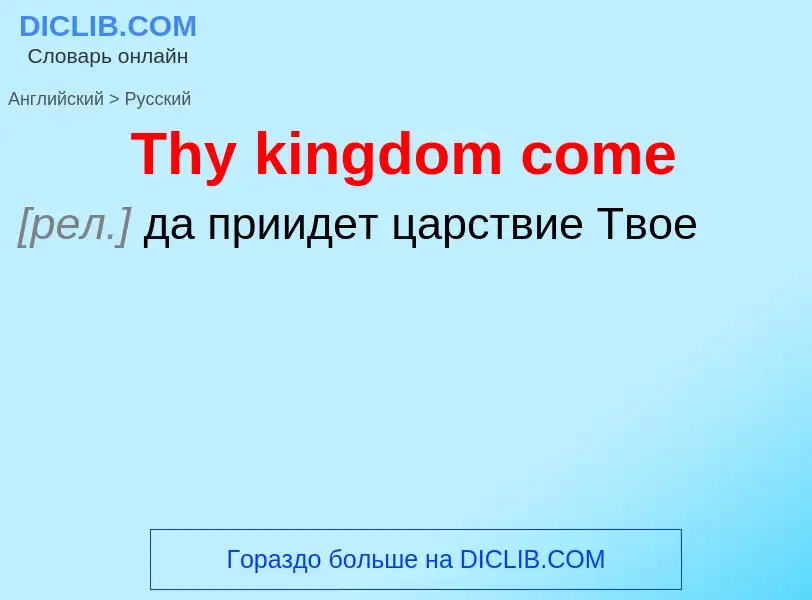Traducción y análisis de palabras por inteligencia artificial ChatGPT
En esta página puede obtener un análisis detallado de una palabra o frase, producido utilizando la mejor tecnología de inteligencia artificial hasta la fecha:
- cómo se usa la palabra
- frecuencia de uso
- se utiliza con más frecuencia en el habla oral o escrita
- opciones de traducción
- ejemplos de uso (varias frases con traducción)
- etimología
Thy kingdom come - traducción al ruso
общая лексика
загробный мир
Definición
Wikipedia
 - James Tissot.jpg?width=120)
The Lord's Prayer, also called the Our Father or Pater Noster, is a central Christian prayer which Jesus taught as the way to pray. Two versions of this prayer are recorded in the gospels: a longer form within the Sermon on the Mount in the Gospel of Matthew, and a shorter form in the Gospel of Luke when "one of his disciples said to him, 'Lord, teach us to pray, as John taught his disciples'". Regarding the presence of the two versions, some have suggested that both were original, the Matthean version spoken by Jesus early in his ministry in Galilee, and the Lucan version one year later, "very likely in Judea".
The first three of the seven petitions in Matthew address God; the other four are related to human needs and concerns. Matthew's account alone includes the "Your will be done" and the "Rescue us from the evil one" (or "Deliver us from evil") petitions. Both original Greek texts contain the adjective epiousion; while controversial, "daily" has been the most common English-language translation of this word.
Initial words on the topic from the Catechism of the Catholic Church teach that it "is truly the summary of the whole gospel". The prayer is used by most Christian denominations in their worship and with few exceptions, the liturgical form is the version from the gospel of Matthew. Protestants usually conclude the prayer with a doxology (in some versions, "For thine is the kingdom, the power and the glory, for ever and ever, Amen"), a later addition appearing in some manuscripts of Matthew. Although theological differences and various modes of worship divide Christians, according to Fuller Seminary professor Clayton Schmit, "there is a sense of solidarity in knowing that Christians around the globe are praying together ... and these words always unite us."

 - James Tissot.jpg?width=200)
![Detail of the ''Europa Polyglotta'' published with ''[[Synopsis Universae Philologiae]]'' in 1741; the map gives the first phrase of the Lord's Prayer in 33 different [[languages of Europe]] Detail of the ''Europa Polyglotta'' published with ''[[Synopsis Universae Philologiae]]'' in 1741; the map gives the first phrase of the Lord's Prayer in 33 different [[languages of Europe]]](https://commons.wikimedia.org/wiki/Special:FilePath/Lithuanian language in European language map 1741.jpg?width=200)

![Owen Jones]] Owen Jones]]](https://commons.wikimedia.org/wiki/Special:FilePath/The Sermon on the Mount (Owen Jones; pp. 17-18).jpg?width=200)


![Lord's Prayer fragment from [[Lindisfarne Gospels]], f. 37r, Latin text, translated in Northumbrian dialect of the Old English. Lord's Prayer fragment from [[Lindisfarne Gospels]], f. 37r, Latin text, translated in Northumbrian dialect of the Old English.](https://commons.wikimedia.org/wiki/Special:FilePath/Lord's prayer fragment from Lindisfarne Gorpels.png?width=200)
![The text of the [[English Language Liturgical Consultation]] version of the Lord's Prayer, written in [[Teeline Shorthand]] and in Latin script for comparison. The text of the [[English Language Liturgical Consultation]] version of the Lord's Prayer, written in [[Teeline Shorthand]] and in Latin script for comparison.](https://commons.wikimedia.org/wiki/Special:FilePath/Teeline-Lords-prayer.png?width=200)
![Syriac]]. Syriac]].](https://commons.wikimedia.org/wiki/Special:FilePath/OLAFTAW.jpg?width=200)
![Lord's Prayer, three versions from left to right: (1) from [[Codex Zographensis]] in Glagolitic script (1100s); (2) from [[Codex Assemanius]] in [[Glagolitic script]] (1000s); (3) from [[Gospels of Tsar Ivan Alexander]] in Bulgarian [[Cyrillic script]] (1355). Lord's Prayer, three versions from left to right: (1) from [[Codex Zographensis]] in Glagolitic script (1100s); (2) from [[Codex Assemanius]] in [[Glagolitic script]] (1000s); (3) from [[Gospels of Tsar Ivan Alexander]] in Bulgarian [[Cyrillic script]] (1355).](https://commons.wikimedia.org/wiki/Special:FilePath/Отче Наш Глаголица Кирилица 03.03.2020.png?width=200)
